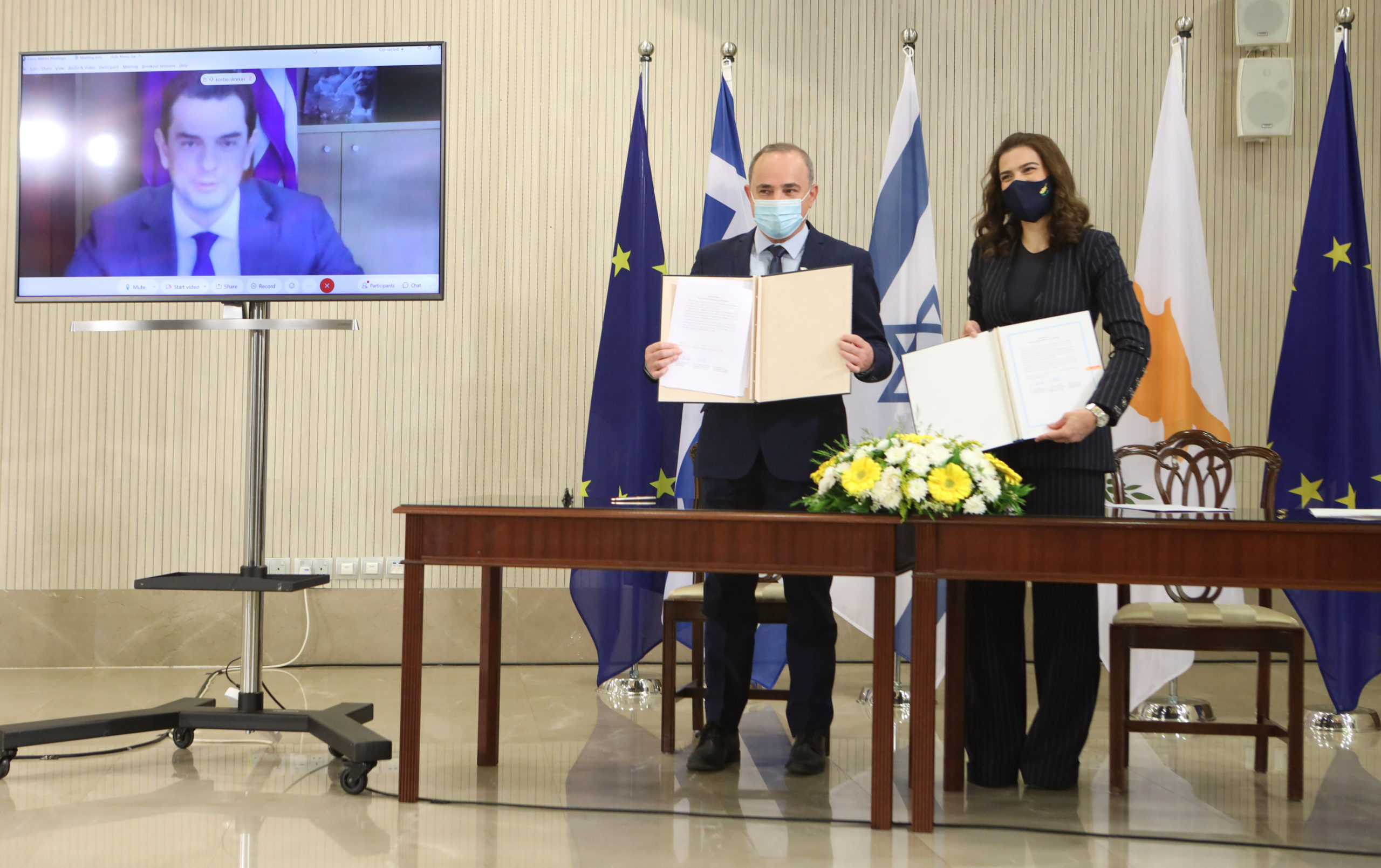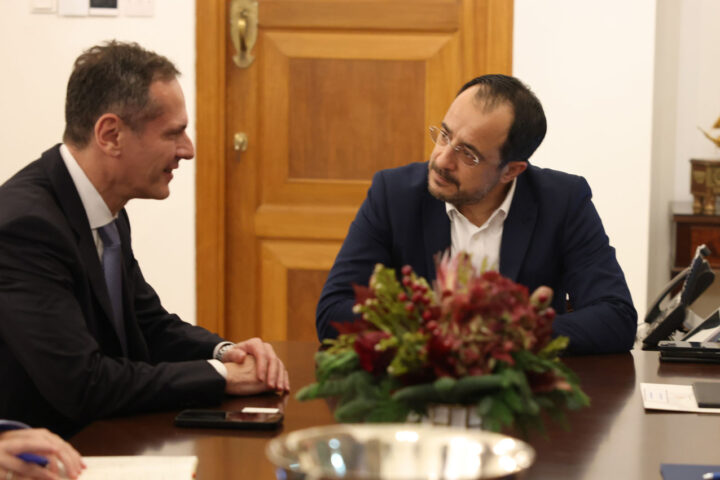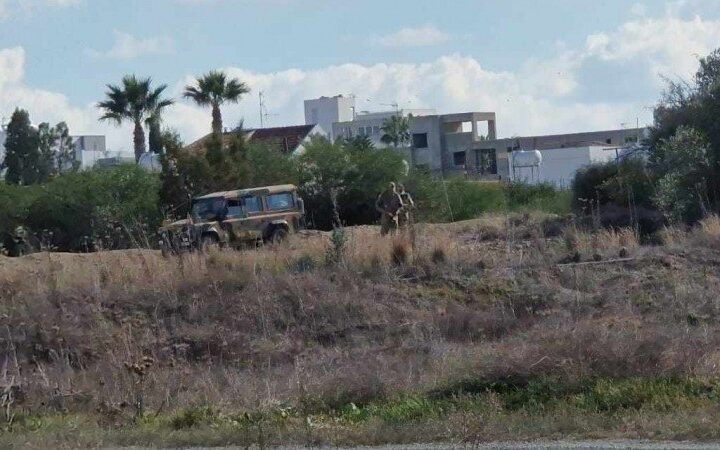The US State Department supports the EuroAsia electricity cable linking Israel and Cyprus’ grids to Europe as a ‘cost effective’ flexible platform to transport clean energy and renewable sources.
Washington’s show of public support comes after Turkey protested against the project, saying the cable went through Turkish waters.
Energy ministers of stakeholder countries Cyprus, Israel and Greece, signed a landmark memorandum of understanding on March 8, paving the way to construct the €2.5 bln electricity cable linking their power grids to begin.
The MoU on the 1208 km EuroAsia Interconnector was signed in Nicosia by Cyprus Energy Minister Natasa Pilides and Israel’s Yuval Steinitz, with Greece’s Costas Skrekas taking part by videoconference.
The 2,000MW-capacity project has already secured building permits for the ‘converter station’ in Cyprus, where the Israel-Cyprus and Crete-Cyprus cables will be linked.
An Energy Ministry sources told the Financial Mirror that the MoU would also help fast-track the licensing and permitting procedures in Israel and Greece.
These ‘trilateral’ meetings and summits have recently included the United States and seek a peaceful resolution to conflicts in the eastern Mediterranean where American energy giants are active in natural gas exploration.
The United States is “supportive of connecting distribution grids of mainland Europe to Cyprus and Israel via the EuroAsia Interconnector,” a spokesperson for the State Department was quoted as saying on Thursday after Ankara protested the MoU.
“It is a cost-effective and flexible route that can be used not only for electricity but as a platform to deploy other renewable energy sources,” the US official told a press briefing.
The spokesperson said the US “supports all efforts to reduce tensions in the Eastern Mediterranean” and welcomes the resumption of exploratory talks between Greece and Turkey in Athens this week.
A joint statement issued by the three ministers in Nicosia last week called the MoU a “major step forward” in integrating renewable energy sources, “enhancing the ability of the three countries to meet their commitments under the Paris Agreement on Climate Change”.
The European Commission acknowledges it as a key Project of Common Interest, making it eligible for financing from the ‘Connecting Europe Facility’, the EU’s €8.7 bln piggy bank to fund clean energy projects to meet the 2050 ‘Green Deal’ zero-carbon targets.
The power cable is viewed as improving ‘energy security’ for Europe while ending Cyprus’ energy isolation as the only non-interconnected EU member state.
“Cyprus, Israel, and Greece have so much to gain from implementing the EuroAsia Interconnector… enhancing our security of energy supply and becoming exporters of energy, are but a few of the tangible benefits,” said Pilides.
The agreement also enables Israel to become a major electricity exporter to Cyprus and Europe.
Israel, Greece, and Cyprus have forged a closer regional alliance based on energy as the three countries also hope to explore and exploit their tapped and untapped natural gas resources.
“For Cyprus, the EuroAsia Interconnector will constitute a decisive step towards ending the island’s energy isolation and, consequently, our dependence on heavy fuels.
“This isolation has been a major hindrance to our economy’s overall competitiveness,” said Pilides.
The underwater cable will be laid in the Mediterranean Sea at a maximum depth of around 2,700 meters.
It is touted as the world’s longest and deepest power cable, considered a technological marvel by the industry.
Turkey demands
The official Anadolu Agency said Monday that Turkey expressed strong reservations over not being consulted over the EU-backed project in the eastern Mediterranean.
Ankara sent a diplomatic note to the Greek and Israeli embassies and the Delegation of the European Union saying that any further action should not take place without seeking permission from the Turkish government.
The diplomatic note claimed the grid passes through Turkey’s territorial waters.
Ankara has been using its ‘gunboat diplomacy’ to stake a claim in Cyprus’ offshore natural gas exploration efforts, creating a stumbling block in resolving its political division.
It also refuses to recognise the Republic of Cyprus, even though it was one of three guarantor countries that established the state in 1960.
Turkey’s comments followed US Secretary of State Antony Blinken’s testimony to the House of Representatives Foreign Affairs Committee that contained indications of further US involvement in the eastern Mediterranean region, as well as direct references to Turkish provocations against Greece.
“We have looked with real concern over the last year…at some of the actions taken in the eastern Mediterranean particularly by Turkey in terms of various claims, and it is very important that the US stands up and engages in advancing stability,” he said.
Blinken said any disputes that arise would be resolved peacefully and diplomatically, “not militarily, not through provocative actions.”
Washington has “called out actions including by Turkey that violate international law or commitments as a NATO ally, and that includes provocative actions against Greece like violations of airspace.”
Blinken stressed Washington’s firm position on supporting a settlement based on the United Nations framework and rejects a two-state solution on the Cyprus issue.










